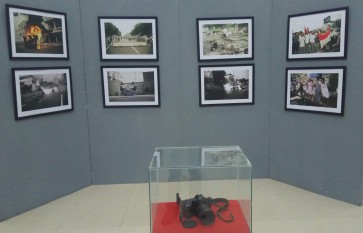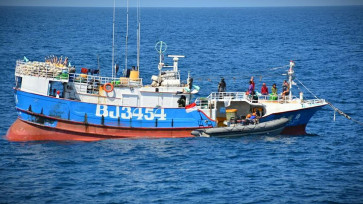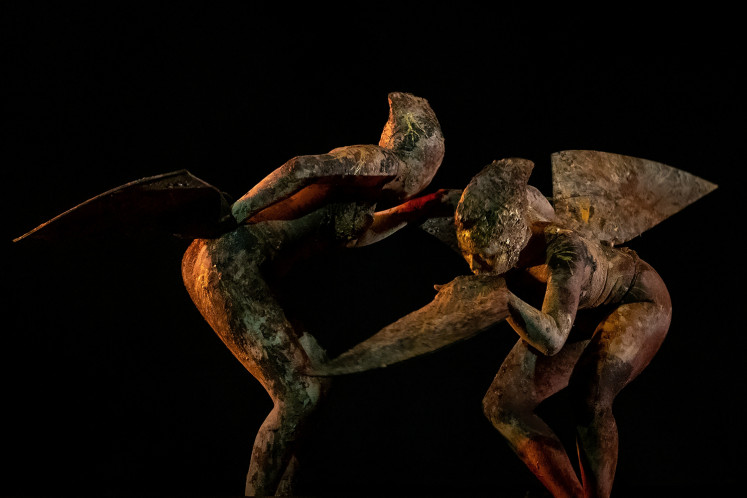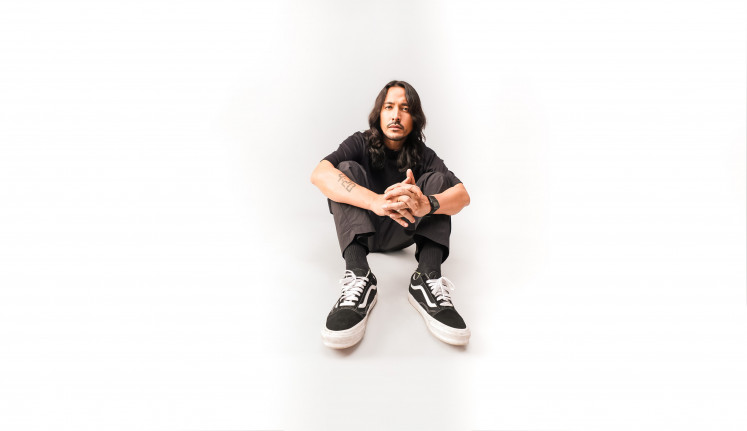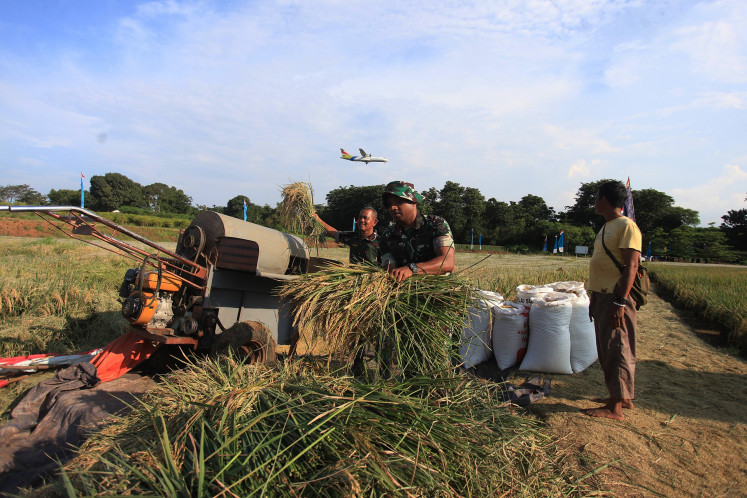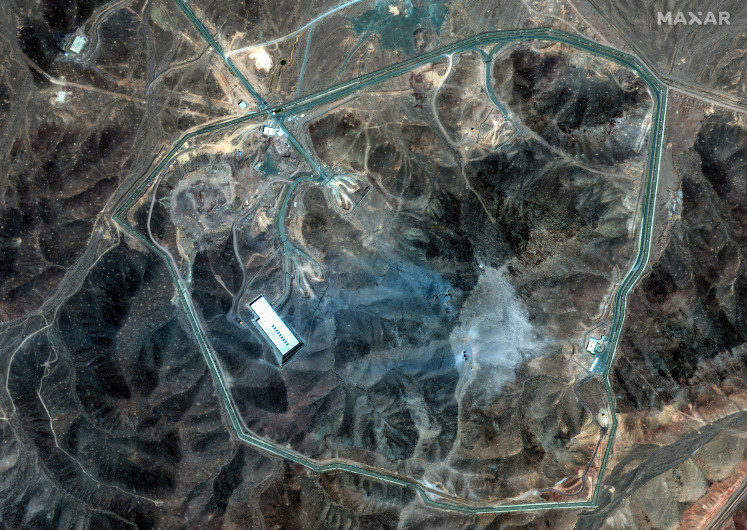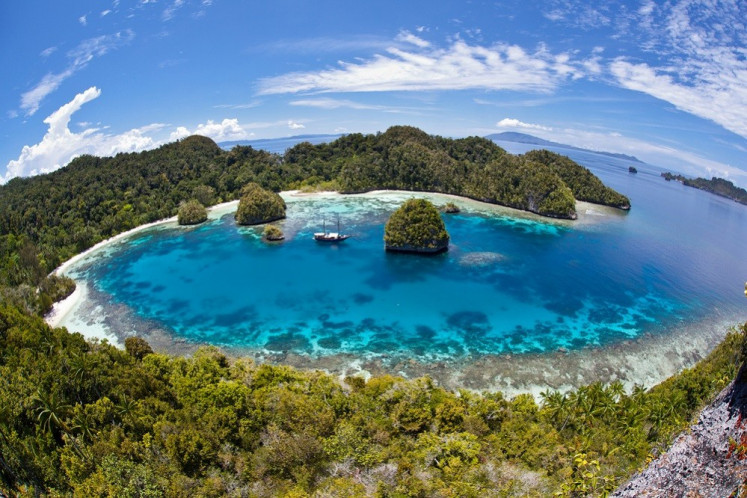Popular Reads
Top Results
Can't find what you're looking for?
View all search resultsPopular Reads
Top Results
Can't find what you're looking for?
View all search resultsAgainst the stream: Iraq artist battles to save boating tradition
Once a common sight across Iraq's southern streams and marshlands, the elongated boats with tapered bows and sterns known as meshhouf have been around "since the time of the Sumerians", said event organiser Rashad Salim.
Change text size
Gift Premium Articles
to Anyone
 In this picture taken on April 29, 2023, a carpenter hammers beams as he builds a traditional “meshhouf“ wooden boat at a workshop in the area of al-Huwair in the sub-district of al-Madinah in Iraq's southern Basra province. A flotilla of traditional wooden boats piloted by young Iraqis makes its way along Baghdad's Tigris river, revealing a glimpse of the now drought-stricken country's ancient waterborne heritage. Once a fixture on Iraq's rivers and marshes, the elongated boats with tapered ends, known as “meshhouf“, have been present “since the time of the Sumerians“, says organiser Rashad Salim -- but their continued existence is threatened by modern technology and the impacts of climate change.
(AFP /Asaad Niazi )
In this picture taken on April 29, 2023, a carpenter hammers beams as he builds a traditional “meshhouf“ wooden boat at a workshop in the area of al-Huwair in the sub-district of al-Madinah in Iraq's southern Basra province. A flotilla of traditional wooden boats piloted by young Iraqis makes its way along Baghdad's Tigris river, revealing a glimpse of the now drought-stricken country's ancient waterborne heritage. Once a fixture on Iraq's rivers and marshes, the elongated boats with tapered ends, known as “meshhouf“, have been present “since the time of the Sumerians“, says organiser Rashad Salim -- but their continued existence is threatened by modern technology and the impacts of climate change.
(AFP /Asaad Niazi )
Y
oung Iraqis row a flotilla of traditional wooden boats down the Tigris river in Baghdad, celebrating an ancient nautical heritage in the now drought-stricken country.
Once a common sight across Iraq's southern streams and marshlands, the elongated boats with tapered bows and sterns known as meshhouf have been around "since the time of the Sumerians", said event organiser Rashad Salim.
But the elegant water craft have long been vastly outnumbered by modern, motorised vessels and are threatened further as Iraq's waterways suffer from droughts linked to climate change.
Iraq must save "from extinction an essential facet of our civilisation which has existed for four or five millenia", said Salim, co-founder of Safina Projects, which works to preserve Iraq's traditional boating culture.
Salim, 62, is a painter, sculptor and eco-artist with a taste for adventure who in his youth joined the famed Norwegian explorer Thor Heyerdahl on a long sea voyage in a traditional Iraqi reed vessel.
Five years ago, Salim set out to find Iraq's last meshhouf makers, locating them in Huweir on the edge of Iraq's famed Mesopotamian marshes, where eventually he would place orders for the construction of new vessels.
Salim then went to nautical clubs and helped create teams that would teach young people how to navigate the gondola-like vessels.
The flotilla on the Tigris in Baghdad was a landmark event in Salim's efforts -- 18 of the boats took to the water on a spring afternoon as part of a cultural festival.
'Connect with environment'
The youthful pilots alternated paddle strokes on the left and right. Some, with only a few weeks' practice in the lead-up to the event, struggled to hold the course.
The meshhouf is part of "the history and heritage of the country", said one of them, Omar Youssef, 21, who has previous experience with sailing and windsurfing.
Those sports "depend on the wind, you have to keep the balance with your body", he said, whereas powering the meshhouf works the "shoulders and arms".
Seven meshhouf clubs have been founded in Baghdad, the central province of Babylon and parts of southern Iraq, with funding from Britain and the Aliph Foundation, which works to protect cultural heritage in conflict zones.
Iraq is still recovering from decades of dictatorship and war, but it faces an additional peril. The United Nations ranks it as one of the world's five countries most impacted by some effects of climate change.
Iraq endures blistering summer heat and frequent dust storms. Declining rain as well as upstream dams have reduced the flow of the Tigris and Euphrates rivers where ancient civilisations flourished.
Salim bemoaned the "terrifying" state of the rivers which suffer from rising "water salinity and pollution". A major aim for him, he said, is to enable young Iraqis to "connect with the environment".
'Revive the heritage'
Salim hails from a prominent family of artists and diplomats -- being the son of artist Nazar Salim and the nephew of famous sculptor and painter Jawad Salim.
His love for traditional Iraqi boats dates back to 1977, when he was the youngest crew member aboard the Tigris, a ship constructed of river reeds by Heyerdahl, the Norwegian adventurer.
To prove that the ancient civilisations of Mesopotamia, Egypt and the Indus Valley were in contact across the seas, they embarked on a 143-day voyage spanning 6,800 kilometres (4,225 miles), from Iraq through the Gulf and the Arabian Sea to Pakistan and on to Djibouti.
In 2013, Salim took part in another expedition of traditional boats, organised by the group Nature Iraq, that sailed 1,200 kilometres along the Tigris from southern Turkey to Iraq's far south.
Salim would also love to revive Iraq's traditional round boat made of woven reeds, the guffa, which resembles a wicker basket that spans more than two metres (six feet).
But his ambition is also to find a "business plan" to make his challenging project financially viable and create jobs.
One of Iraq's traditional boat builders is Zouheir Raisan, 40, who lives by the marshes in Huweir, 400 kilometres south of Baghdad.
Business had stopped in the 1990s but was slowly revived four years ago, a change the father of eight welcomes to supplement his main job as a truck driver.
Under the shade of a mudhif reed structure, he was sawing boards and helping his cousin nail them to a boat frame.
He said he remembers helping his father and brothers make meshhoufs, some measuring up to 11 metres long.
Other countries, he said, are sending experts "in search of this heritage, to encourage its rebirth," he said.
"Why don't we bring it back to life ourselves?"

